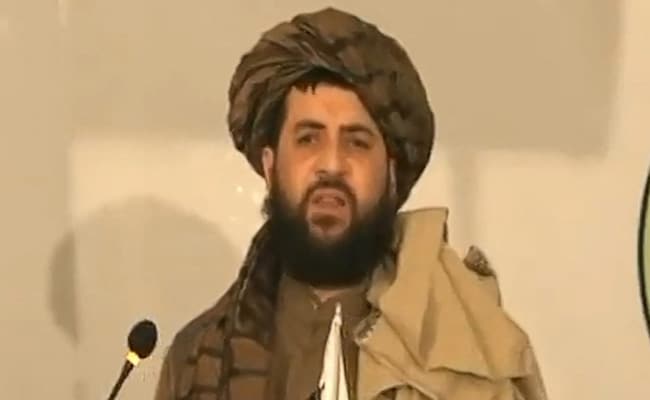 Sarah Zaman
Sarah Zaman
VOA News
April 26, 2024
ISLAMABAD — Pakistan’s decision earlier this week to extend the term of a key document that allows Afghans to live in the country legally has created some breathing room for refugees who fear they would be sent back to Afghanistan.
However, concerns remain about Pakistan’s controversial moves in recent months to expel refugees, which has already seen hundreds of thousands of Afghans forced to return to their economically unstable homeland.
On Monday, Prime Minister Shehbaz Sharif’s Cabinet approved extending proof of registration cards for Afghan refugees that expired April 1st to June 30, according to an official statement.
The document allows access to health, educational, and banking facilities for Afghan refugees.
According to the statement issued by the Ministry of Information, expulsion of documented refugees will come at a later stage.
“The POR cardholders will be sent back in the third stage of the program to expel foreigners residing illegally in Pakistan,” the statement said.
Faced with rising terror attacks, Pakistan launched a drive in October 2023 to evict foreign nationals residing illegally in the country.
The decision primarily impacted Afghans who arrived in Pakistan over the last four decades, seeking refuge from war and poverty at home.
In the first phase of the on-going drive, more than half a million Afghans have left Pakistan since last fall, according to data compiled by the United Nations High Commission for Refugees (UNHCR) and the International Organization for Migration (IOM).
According to the UNHCR, Pakistan is now home to around 3.1 million Afghans. Data shows 1.35 million are registered or POR cardholders. More than 800 thousand have Afghan citizenship cards while the remaining are unregistered.
In the second phase, Pakistan plans to repatriate Afghan citizenship card (ACC) holders. At a recent news briefing, the spokesperson for Pakistan’s Ministry of Foreign Affairs clarified the second phase of the expulsion program had not yet begun.
“I would like to underline that Pakistani authorities are considering all aspects of the Illegal Foreigners Repatriation Plan and at this point there are no plans to repatriate the ACC holders,” Mumtaz Zahra Baloch said. “When such a decision is taken the relevant authorities will make an announcement,” she added addressing media reports suggesting the phase had been launched.
Afghan Taliban as well as international and Pakistani human rights activists have condemned Islamabad’s plan to send Afghans back.
Rights activists worry women and girls will live under severe repression as the Afghan Taliban have forbidden women from most jobs and public spaces, and banned education for girls beyond the sixth grade.
“Pakistan’s ‘Illegal Foreigners’ Repatriation Plan’ is in violation of refugee and international human rights law,” Amnesty International said in a statement earlier this month.
A recent survey by Save the Children revealed nearly 65 percent of the 250,000 children who returned to Afghanistan from Pakistan are not in school anymore, largely because of a lack of documents needed to enroll.
Pakistan is not a signatory to the 1951 U.N. convention protecting refugee rights. But the country has run registration drives in the past with help from the UNHCR to give Afghans documentation that gave them long term protection.
Since the Taliban took control of Afghanistan after the chaotic withdrawal of U.S. troops in August 2021, Pakistan has seen a spike in terror attacks primarily by the Tehreek-e-Taliban Pakistan (TTP), an ideological offshoot of the Afghan Taliban. TTP and groups affiliated with it have killed thousands of Pakistani security personnel in attacks concentrated in the provinces along the border between Afghanistan and Pakistan.
Pakistani military and the government accuse Afghan Taliban of providing a haven to anti-state terrorists, a charge the de facto rulers in Kabul deny. Pakistani authorities claim Afghan nationals have been involved in several deadly attacks on Pakistani security personnel.


 RFE/RL’s Radio Azadi: The Taliban has abolished the pension system in Afghanistan, which is gripped by a devastating economic and humanitarian crisis. The move has triggered protests by retirees who say they cannot survive without state assistance. Scores of retired civil servants and retired members of the armed forces staged a rally in Kabul on April 20. The protest was dispersed by the Taliban. In early April, the Taliban’s spiritual leader, Mullah Haibatullah Akhundzada, ordered his government to stop deducting retirement contributions from the salaries of civil servants, effectively dismantling the pension system. Akhundzada suggested that the system was “un-Islamic.”
RFE/RL’s Radio Azadi: The Taliban has abolished the pension system in Afghanistan, which is gripped by a devastating economic and humanitarian crisis. The move has triggered protests by retirees who say they cannot survive without state assistance. Scores of retired civil servants and retired members of the armed forces staged a rally in Kabul on April 20. The protest was dispersed by the Taliban. In early April, the Taliban’s spiritual leader, Mullah Haibatullah Akhundzada, ordered his government to stop deducting retirement contributions from the salaries of civil servants, effectively dismantling the pension system. Akhundzada suggested that the system was “un-Islamic.”  Khaama: On Friday, Afghanistan defeated Iraq 5-3, edging closer to qualification for the 2024 FIFA Futsal World Cup. The Afghanistan National Futsal team faced Iraq in the semifinal stage of the FIFA Futsal World Cup qualifiers. Afghanistan will have to play against the winner of the match between Kyrgyzstan and Vietnam to secure a spot in the Futsal World Cup. If Afghanistan wins that match, which will be held on Sunday morning, it will qualify for the Futsal World Cup.
Khaama: On Friday, Afghanistan defeated Iraq 5-3, edging closer to qualification for the 2024 FIFA Futsal World Cup. The Afghanistan National Futsal team faced Iraq in the semifinal stage of the FIFA Futsal World Cup qualifiers. Afghanistan will have to play against the winner of the match between Kyrgyzstan and Vietnam to secure a spot in the Futsal World Cup. If Afghanistan wins that match, which will be held on Sunday morning, it will qualify for the Futsal World Cup. 
 Khaama: Islamabad’s special envoy for Afghanistan Asif Durrani said on Wednesday that Pakistan has suffered more due to Afghanistan’s internal situation than Pakistan has suffered in three wars with India in terms of blood spilt and finances drained.
Khaama: Islamabad’s special envoy for Afghanistan Asif Durrani said on Wednesday that Pakistan has suffered more due to Afghanistan’s internal situation than Pakistan has suffered in three wars with India in terms of blood spilt and finances drained.  Afghanistan International: Amnesty International’s recent report has highlighted the dire human rights situation in Afghanistan. The organisation has pointed out severe repression and violations suffered by the Afghan people, with a particular emphasis on violence and discrimination against ethnic groups, notably the Hazaras. Released on Tuesday, April 23, the report also mentioned the Taliban’s policies targeting women and girls, to eradicate their presence from social spheres. The report underscores that Uzbeks, Hazaras, Tajiks, and Turkmen communities are experiencing heightened marginalisation, and often forcibly displaced from their homes and lands. Furthermore, Taliban officials have consistently favoured tribal communities, predominantly Pashtuns, in disputes over land and livestock, particularly in conflicts involving Hazaras. Hazaras have been compelled by the Taliban to compensate tribals for missing livestock dating back to 20 years ago. Additionally, the report documents targeted attacks on Hazara individuals, including the killing of men from this ethnic group in the Uruzgan province.
Afghanistan International: Amnesty International’s recent report has highlighted the dire human rights situation in Afghanistan. The organisation has pointed out severe repression and violations suffered by the Afghan people, with a particular emphasis on violence and discrimination against ethnic groups, notably the Hazaras. Released on Tuesday, April 23, the report also mentioned the Taliban’s policies targeting women and girls, to eradicate their presence from social spheres. The report underscores that Uzbeks, Hazaras, Tajiks, and Turkmen communities are experiencing heightened marginalisation, and often forcibly displaced from their homes and lands. Furthermore, Taliban officials have consistently favoured tribal communities, predominantly Pashtuns, in disputes over land and livestock, particularly in conflicts involving Hazaras. Hazaras have been compelled by the Taliban to compensate tribals for missing livestock dating back to 20 years ago. Additionally, the report documents targeted attacks on Hazara individuals, including the killing of men from this ethnic group in the Uruzgan province.  Ariana: Attack Energy FC defeated Sorkh Poshan Khafi 1-0 in the 9th match of Afghanistan Champions League (ACL) in Kabul on Wednesday. Hasib Ahadi scored the only goal and was named man of the match. In the 10th ACL match, played on Wednesday, Istiqlal Kabul FC beat Mawj Sahil FC 2-1. Tomorrow’s matches will see Khadim FC take on Maiwand FC at 1:00 PM, while Jawanan Wahedi FC face Adalat Farah FC at 3:30 PM.
Ariana: Attack Energy FC defeated Sorkh Poshan Khafi 1-0 in the 9th match of Afghanistan Champions League (ACL) in Kabul on Wednesday. Hasib Ahadi scored the only goal and was named man of the match. In the 10th ACL match, played on Wednesday, Istiqlal Kabul FC beat Mawj Sahil FC 2-1. Tomorrow’s matches will see Khadim FC take on Maiwand FC at 1:00 PM, while Jawanan Wahedi FC face Adalat Farah FC at 3:30 PM.